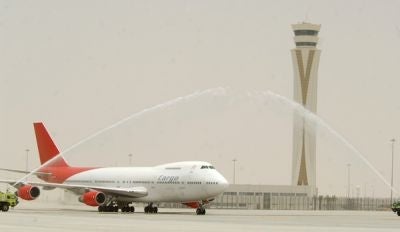The first section of Dubai's ambitious attempt at creating the world's largest airport opened June 27, highlighting again the region's seemingly unstoppable march towards being a global aviation superpower.
Al Maktoum International will open to passenger traffic next March, but already has the capability to handle the enormous A380 on the first of its five planned runways.
When eventually completed, the airport will be the largest in the world, capable of handling 160 million passengers a year though four giant terminals, considerably more than the current capacity of Dubai International, which is 65 million passengers.
Airport authorities claim that the new airport has been purpose-designed for such a throughput, with high-capacity car parks, check-in counters, security checks and baggage handling facilities making flights and transfers easier for passengers.
Dubai's intent to have two airports with a combined throughput of over 200 million passengers a year is consistent with the aim of its flag-carrier, Emirates, to become the world's number one airline using a "hub-based" model.
Earlier in June, Emirates announced it was to purchase a total of 90 A380 "superjumbos" (setting a record for the single largest order in aviation history), each capable of carrying over 500 people and flying around 15,000 kilometers.
With such a fleet, the airline is set to become an indisputable global people mover (it is already fourth largest in terms of international scheduled kilometers flown), and Dubai will become one of the most important transport hubs in the world.
While European rivals accuse Emirates, and to a lesser extent its gulf compatriots Etihad and Qatar, of receiving an unfair advantage in the form of considerable state financial backing, there is no doubt that the rise of Emirates has its advantages for passengers.
The high-capacity aircraft the airline uses, combined with the low operating costs of flying through Dubai airports, results in cheaper fares, by some estimates as much as 25-50 percent lower than "legacy" European flag-carriers.
As a spot check example, a flight to Bangkok from Paris in mid-September (if booked June 28) would be over €100 cheaper on Emirates than Air France, while a flight to Tokyo from London in mid-October would be some £70 cheaper than on British Airways.
Such comparisons are necessarily crude, given the multitude of flight dates and options available from global carriers (and the associated inconvenience of traveling with a stopover in Dubai compared to the direct flights offered by European flag-carriers), but they give a flavor of the price differences seen between hub-based Gulf carriers and their traditional rivals.
But as Dubai's hubs grow in capacity and in comfort, the region's appeal for bargain-hungry passengers is likely to gain in strength and as Emirates retains a "service-driven" business model far removed from the ancillary-fees model seen by some US and European carriers, it's a good thing for passenger experience.
Emirates has been lauded multiple times for its economy in-flight entertainment options, for instance, as well as becoming the first airline in the world to allow phone calls on a commercial flight when it launched the service in 2008.
The airline is also rumored to be gearing up for yet another big announcement at the second major airshow of the year at the Farnborough airshow (July 19-25) in the UK, prompting many to wonder what's next for the region that seems determined to change the way that we fly.

Join our commenting forum
Join thought-provoking conversations, follow other Independent readers and see their replies
Comments